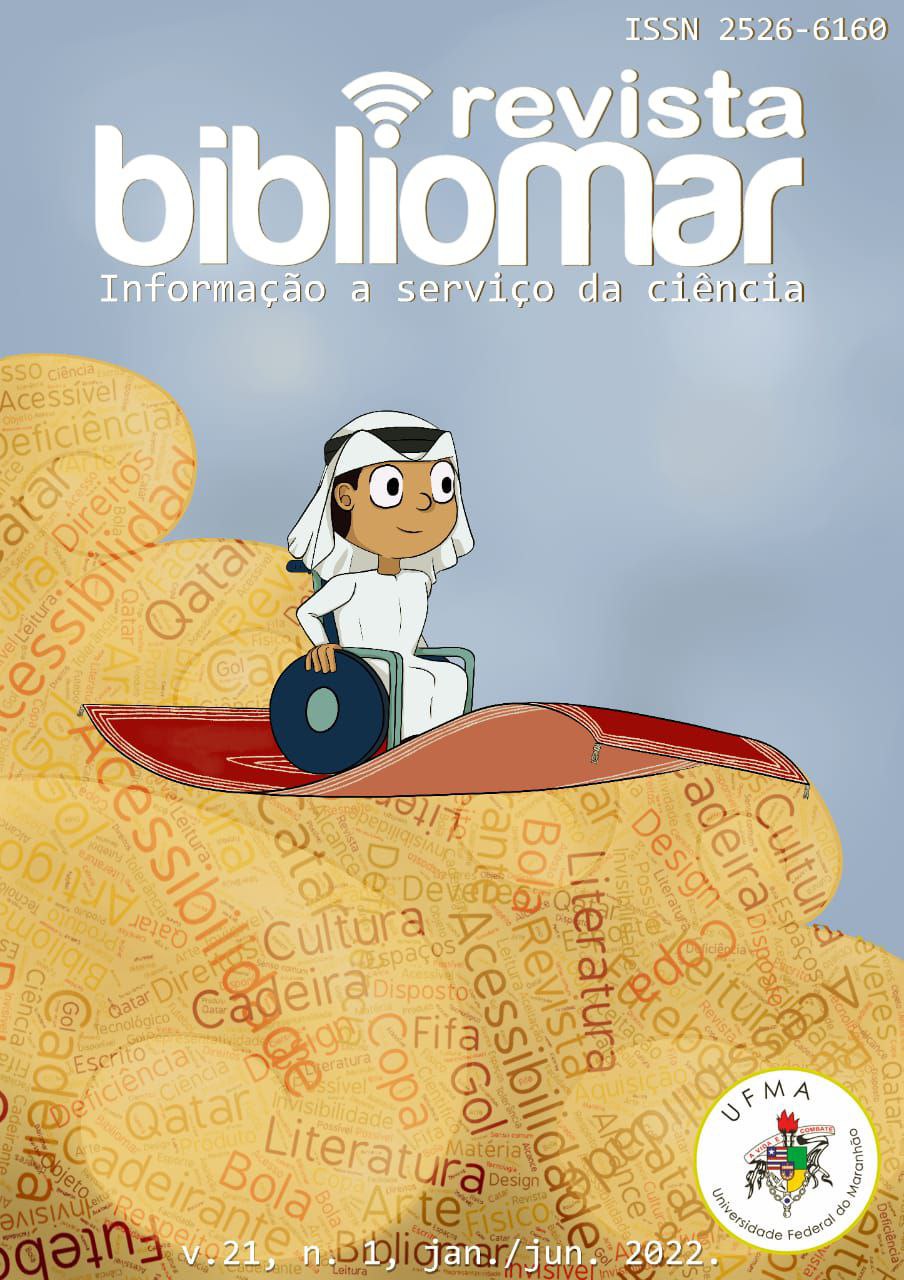BIBLIOTECA, PROJETOS SOCIOAMBIENTAIS E EDUCAÇÃO
sugestões de práticas lúdicas para a mediação da informação ambiental
DOI:
https://doi.org/10.18764/2526-6160v21n1.2022.3Palavras-chave:
mediação da informação, meio ambiente, educação ambiental, informação ambiental, projetos socioambientaisResumo
A criação de um ambiente saudável com base no desenvolvimento sustentável se dá por meio de campanhas de sensibilização, de educação e de articulação com outras instituições. É obrigação de todos o zelo pelo mundo, pelo nosso planeta e a educação deve abordar em seu currículo, do ensino infantil ao ensino superior, temáticas que fomentem a participação e responsabilidade social do cidadão, instruam o cuidado com o meio ambiente e desenvolvam ideias sustentáveis. A Biblioteca no cenário da Mediação passa a ser um local de encontro para troca de saberes e experiências, um local que permite a interação e interlocução dos sujeitos que a frequentam. O objetivo da pesquisa é descrever a importância da implantação de projetos socioambientais nas bibliotecas e apontar práticas lúdicas de mediação da informação ambiental. A pesquisa é classificada como descritiva, de caráter qualitativo. A metodologia base foi realizada por pesquisa bibliográfica acerca do tema e análise de dados. É de suma importância que a conscientização e a responsabilidade ambiental sejam disseminadas na sociedade, e a Biblioteca e o Bibliotecário ganham papel importante como mediadores da informação. A Biblioteca pode ser um local de promoção da educação ambiental para o desenvolvimento de ações sustentáveis na mediação da informação para diferentes gerações e por diferentes práticas, desde a mais humanizada até a remota.
Downloads
Referências
ALMEIDA JÚNIOR, O. F. de. Mediação da informação: ampliando o conceito de disseminação. In: VALENTIM, M. L. P. (org.). Gestão da informação e do conhecimento. São Paulo: Polis: Cultura Acadêmica, 2008. p. 41-54.
ALVES, A. P.; SAHEB, D. A educação ambiental na educação infantil. In: CONGRESSO NACIONAL DE EDUCAÇÃO EDUCERE, 11., 2013, Curitiba. Anais eletrônicos [...]. Curitiba: PUCPR, 2013. p. 30025-30032. Disponível em: https://educere.bruc.com.br/arquivo/pdf2013/7774_6497.pdf. Acesso em: 18 jan. 2021.
AZEVEDO, K. R. de; OGÉCIME, M. O papel do bibliotecário como mediador da informação na busca pelo letramento informacional. RDBCI: Rev. Digit. Bibliotecon. Ciênc. Inf., Campinas, v. 18, p. 1-17, 2020. DOI 10.20396/rdbci.v018i0.8654473. Disponível em: https://periodicos.sbu.unicamp.br/ojs/index.php/rdbci/article/view/8654473/21896. Acesso em: 18 jan. 2021.
BRASIL. Presidência da República. Casa Civil. Subchefia para Assuntos Jurídicos. Lei 9.394, de 20 de dezembro de 1996. Estabelece as diretrizes e bases da educação nacional. Brasília, DF: Presidência da República, 1996. Disponível em: http://www.planalto.gov.br/ccivil_03/leis/l9394.htm#:~:text=Da%20Educa%C3%A7%C3%A3o%20Infantil-,Art.,da%20fam%C3%ADlia%20e%20da%20comunidade. Acesso em: 18 jan. 2021.
BRASIL. Ministério da Cidadania. Coronavírus: cartilha de orientação para as comunidades terapêuticas. Brasília, DF: MDS, [2020]. Disponível em: http://www.mds.gov.br/webarquivos/cidadania/publicacoes/Coronavirus_ComTerapeuticas_online.pdf%20(1).pdf. Acesso em: 23 maio 2022.
CASTRO, M. L. de; CANHEDO JÚNIOR, S. G. Educação ambiental como instrumento de participação. In: PHILIPPI JÚNIOR, A.; PELICIONI, M. C. F. (ed.). Educação ambiental e sustentabilidade. Barueri: Manole, 2005. v. 3, cap. 15, p. 401-411. (Coleção ambiental).
JACOBI, P. Educação ambiental, cidadania e sustentabilidade. Cadernos de pesquisa, [s. l.], n. 118, p. 189-205, mar. 2003. Disponível em: https://www.scielo.br/j/cp/a/kJbkFbyJtmCrfTmfHxktgnt/?format=pdf&lang=pt. Acesso em: 18 jan. 2021.
LUZZI, D. Educação ambiental: pedagogia, política e sociedade. In: PHILIPPI JÚNIOR, A.; PELICIONI, M. C. F. (ed.). Educação ambiental e sustentabilidade. Barueri: Manole, 2005. v. 3, cap. 14, p. 381-400. (Coleção ambiental).
PENTEADO, H. D. Meio ambiente e formação de professores. São Paulo: Cortez, 1997.
REIGOTA, M. Desafios à educação ambiental escolar. In: JACOBI, P. et al. (org.). Educação, meio ambiente e cidadania: reflexões e experiências. São Paulo: SMA, 1998. p. 43-50.
SANTOS NETO, J. A, dos; ALMEIDA JÚNIOR, O. F. de. O caráter implícito da mediação da informação. Inf. & Soc.: Est., João Pessoa, v. 27, n. 2, p. 253-263, maio/ago. 2017. Disponível em: https://brapci.inf.br/index.php/res/download/95956. Acesso em: 1 fev. 2021.
SILVA, A. M. da. Mediações e mediadores em Ciência da Informação. Prisma.com, Porto, n. 9, p. 68-104, 2009. Disponível em: http://ojs.letras.up.pt/index.php/prismacom/article/view/2057. Acesso em: 1 fev. 2021.
Downloads
Publicado
Como Citar
Edição
Seção
Licença
Copyright (c) 2022 Revista Bibliomar

Este trabalho está licenciado sob uma licença Creative Commons Attribution 4.0 International License.
DECLARAÇÃO DE RESPONSABILIDADE
Senhores editores da Revista Bibliomar,
Declaro que submeti o artigo __________________________________ para avaliação e parecer, e que estou ciente das condições para publicação nesta revista, entre as quais destaco:
a) não há omissão de ligações ou acordo de financiamento entre aqueles que venham a se interessar pela publicação deste trabalho;
b) o trabalho é original e inédito e que não foi enviado nenhum texto similar a este, sob minha autoria, a outro periódico, durante o período em que este texto estiver sob a avaliação da Revista Bibliomar;
c) este trabalho é fruto de pesquisas por mim realizadas e não há omissão de nenhum autor por mim citado.
Respeitosamente,
Loca/data____________, ______/_____/_____
Assinatura do autor(es)
DIREITOS DE PUBLICAÇÃO
Qualquer usuário poderá ter direito de:
- Compartilhar — copiar, baixar, imprimir ou redistribuir o material em qualquer suporte ou formato
- Adaptar — remixar, transformar, e criar a partir do material para qualquer fim, mesmo que comercial.
De acordo com os seguintes termos:
- Atribuição — Você deve dar o crédito apropriado, prover um link para a licença e indicar se mudanças foram feitas. Você deve fazê-lo em qualquer circunstância razoável, mas de maneira alguma que sugira ao licenciante a apoiar você ou o seu uso.
- Sem restrições adicionais — Você não pode aplicar termos jurídicos ou medidas de caráter tecnológico que restrinjam legalmente outros de fazerem algo que a licença permita.






